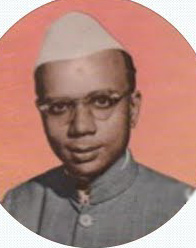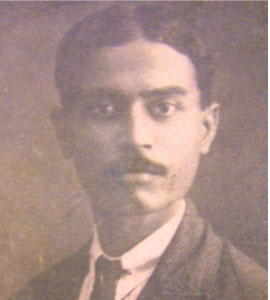Gujarat Sahitya Sabha, originally called the Social and Literary Association is a literary institution for the promotion of Gujarati literature located in the city of Ahmedabad, India. It was founded by Ranjitram Vavabhai Mehta in 1898. Its name was later changed in 1905.
The history of Gujarati literature may be traced to 1000 AD, and this literature has flourished since then to the present. It is unique in having almost no patronage from a ruling dynasty, other than its composers.

Nanalal Dalpatram Kavi was an Indian writer and poet in Gujarati language of Gujarati literature. His name is sometimes spelled as Nhanalal.

Kumarpal Balabhai Desai is an author, critic, editor, journalist, columnist and translator from Gujarat, India. He studied and later taught at the Gujarat University. He is associated with several social and Gujarati literary organisations such as Gujarati Sahitya Parishad. He has written and edited more than hundred books including biographies and several works on Jainism. He was awarded the Padma Shri in 2004.

Sukhlal Sanghvi, also known as Pandit Sukhlalji, was a Jain scholar and philosopher. He belonged to the Sthanakvasi sect of Jainism. Pandit Sukhlal lost his eyesight at the age of sixteen on account of smallpox. However, he persisted and became profoundly versed in Jain logic and rose to become a professor at Banaras Hindu University. Paul Dundas calls him one of the most incisive modern interpreters of Jain philosophy. Dundas notes that Sanghavi represents what now seems to be a virtually lost scholarly and intellectual world. He was a mentor for famous Jain scholar Padmanabh Jaini. During his lifetime he won such awards as the Sahitya Akademi Award and won recognition from the Government of India by getting Padma Bhushan award. Sukhlalji was also known as Pragnachaksu because he was so vastly learned despite being visually disabled.

Navalram Laxmiram Pandya was a Gujarati critic, playwright, poet, essayist, editor, educationist and a social reformer. He is considered to be a most important figure in modern Gujarati literature. The first humourist, the first historical dramatist, the first critic and a leading scholar of his age, Navalram was the first to herald the new generation of writers like Manilal Dwivedi, Govardhanram Tripathi and Narsinhrao Divetia. His writings covered numerous areas, including philosophy, patriotism, reformation, education, journalism, grammar and literature.
Muni Jinvijayji was a scholar of orientalism, archeology, indology and Jainism from India.

Harivallabh Chunilal Bhayani was a linguist, researcher, critic and translator from India.

Dewan Bahadur Keshavlal Harshadrai Dhruv, also spelt as Keshavlal Harshad Dhruva and known by his pen name Vanmali, was a research scholar, philologist, critic, editor of Middle and Old Gujarati works, and translator of Sanskrit classic poetry and plays from India. He was a professor of Gujarati and taught at Gujarat College. He headed several literary organizations.

Bhogilal Jayachandbhai Sandesara was a literary critic, scholar and editor from Gujarat, India. He was a scholar of Sanskrit, Prakrit, Apabhramsha and Old Gujarati language. He also contributed to the field of historical and cultural research. He has edited large number of historical works. He was appointed the president of Gujarati Sahitya Parishad in 1987.
Mansukhlal Maganlal Jhaveri (1907–1981) was a Gujarati language poet, critic, and literary historian of the Gandhian era. He was deeply interested in classical Sanskrit poetry and authored History of Gujarati Literature (1978). Jhaveri had several pen-names including Devaki Ayodhya, Punarvasu, Madilant, Samintiyajak, and Siddhartha.
Prabodh Bechardas Pandit was an Indian linguist from Gujarat, India. He published a total of ten books in the Gujarati language, along with many research papers published in various journals. In 1967, he received the Sahitya Akademi Award, and in 1973, the Ranjitram Suvarna Chandrak, for his contribution to the study of Gujarati language and linguistics.
Ramprasad Premshankar Bakshi was a Gujarati writer, scholar, translator and editor from India. He was a student of Anandshankar Dhruv and Narsinhrao Divetia, and was appointed the president of Gujarati Sahitya Parishad during 1976–77.
Kantilal Baldevram Vyas was a Gujarati linguist, critic and editor from Gujarat, India. He published several works in the field of linguistics including Bhasha Vijnan, Bhasha, Vrutt ane Kavyalankar, Gujarati Bhashano Udgam, Vikas and Swaroop and Bhasha Sanshodhan.
Hariprasad Gangashankar Shastri was an Indian scholar, historian, epigraphist, Indologist and editor primarily known for his work on the political and cultural history of Gujarat state. He spent much of his career at the B. J. Institute of Learning and Research, Ahmedabad, as a lecturer, professor, deputy director and then as director.

Hasmukhray Vrajlal Yajnik, better known as Hasu Yajnik, also spelled Hasu Yagnik was an Indian Gujarati language novelist, short story writer, critic, editor, folklorist and children's writer. Born and educated in Rajkot, he served as a professor of Gujarati in various government colleges in Gujarat. He had written twenty novels, three short story collections, two jail stories, four medieval story collections, criticism of four medieval works, and edited twelve folk works and six works of children's literature.
Shankarlal Gangashankar Shastri was a Gujarati literary critic and short-story writer. He was an elder brother of Hariprasad Shastri and a grandson of Vrajlal Shastri.

Dewan BahadurNarmadashankar Devshankar Mehta was a Gujarati writer, historian of philosophy, and administrator from British India. He was a student of Anandshankar Dhruv, and a nephew of Balashankar Kantharia.

Kanchanlal Vasudev Mehta, better known by his pen name Malayanil, was a Gujarati short story writer from British India known for his humorous pieces. He was a pioneer of modern short story writing in Gujarati.
Jahangir Edalji Sanjana, also known by his short name J. E. Sanjana, was a Gujarati literary critic and professor from Gujarat, India.










